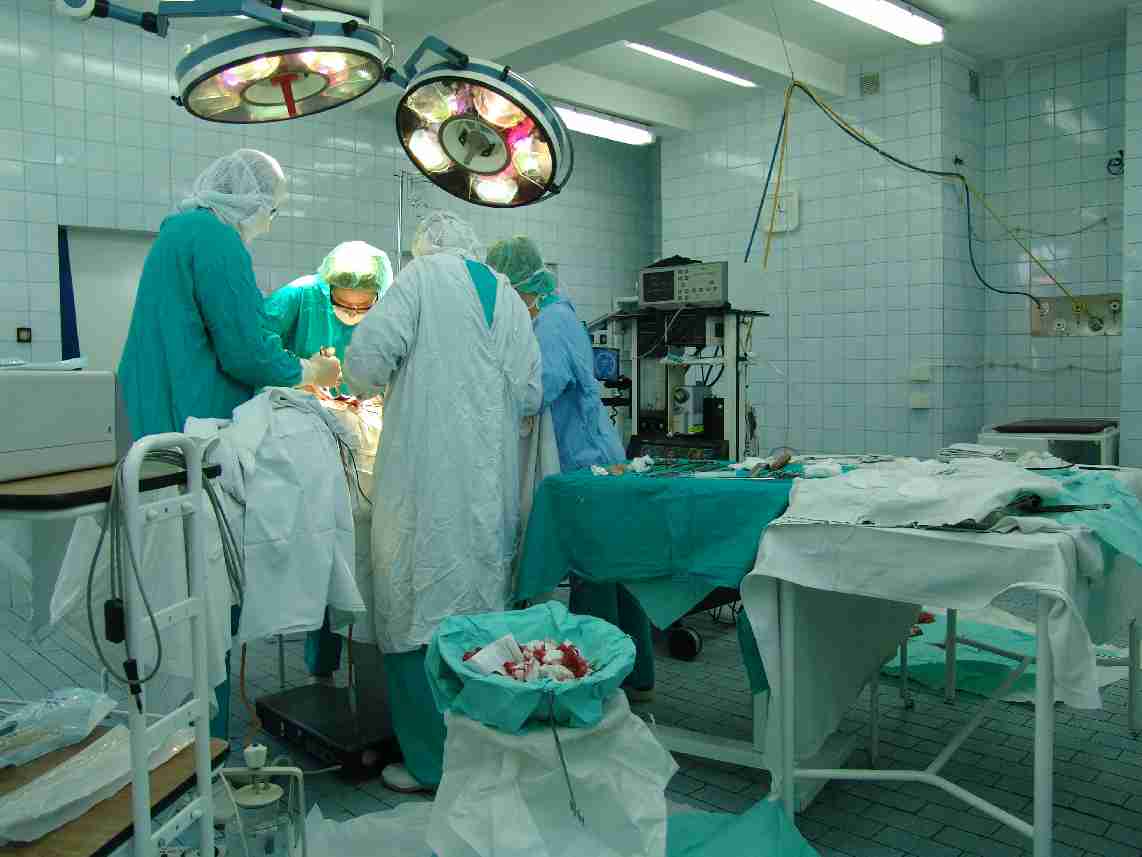|
Tayler Bequest Hospital (Mount Fletcher)
Tayler Bequest District Hospital is a Provincial government funded hospital in the Elundini Local Municipality area in Mount Fletcher, Eastern Cape in South Africa. The hospital departments include Emergency department, Paediatric ward, Maternity ward, Obstetrics/Gynecology, Out Patients Department, Surgical Services, Medical Services, Operating Theatre & CSSD Services, Pharmacy, Anti-Retroviral (ARV) treatment for HIV/AIDS, Post Trauma Counseling Services, X-ray Services, Physiotherapy, NHLS Laboratory, Oral Health Care Provides, Laundry Services, Kitchen Services and Mortuary A morgue or mortuary (in a hospital or elsewhere) is a place used for the storage of human corpses awaiting identification (ID), removal for autopsy, respectful burial, cremation or other methods of disposal. In modern times, corpses have cus .... References Eastern Cape Department of Health website - Joe Gqabi District Hospitals Hospitals in the Eastern Cape Joe Gqabi District Municipality ... [...More Info...] [...Related Items...] OR: [Wikipedia] [Google] [Baidu] |
Mount Fletcher
Mount Fletcher (officially Tlokoeng) is a town in Joe Gqabi District Municipality in the Eastern Cape province of South Africa South Africa, officially the Republic of South Africa (RSA), is the southernmost country in Africa. It is bounded to the south by of coastline that stretch along the South Atlantic and Indian Oceans; to the north by the neighbouring count ..., 69 km north-north-east of Maclear. Founded in 1882, it takes its name from the mountain nearby. This was probably named after the Reverend John Fletcher of Madeley in England, a friend of John Wesley, although it is stated to have been named after a Captain Fletcher who was stationed there. The provincial hospital in Mount Fletcher is named Tayler Bequest. Eastern Cape Dept of Health website References Populated places in the Elundini Local Municipality Populated places established in 1882 {{EasternCape-geo-stub ... [...More Info...] [...Related Items...] OR: [Wikipedia] [Google] [Baidu] |
Medical
Medicine is the science and practice of caring for a patient, managing the diagnosis, prognosis, prevention, treatment, palliation of their injury or disease, and promoting their health. Medicine encompasses a variety of health care practices evolved to maintain and restore health by the prevention and treatment of illness. Contemporary medicine applies biomedical sciences, biomedical research, genetics, and medical technology to diagnose, treat, and prevent injury and disease, typically through pharmaceuticals or surgery, but also through therapies as diverse as psychotherapy, external splints and traction, medical devices, biologics, and ionizing radiation, amongst others. Medicine has been practiced since prehistoric times, and for most of this time it was an art (an area of skill and knowledge), frequently having connections to the religious and philosophical beliefs of local culture. For example, a medicine man would apply herbs and say prayers for hea ... [...More Info...] [...Related Items...] OR: [Wikipedia] [Google] [Baidu] |
Mortuary
A morgue or mortuary (in a hospital or elsewhere) is a place used for the storage of human corpses awaiting identification (ID), removal for autopsy, respectful burial, cremation or other methods of disposal. In modern times, corpses have customarily been refrigerated to delay decomposition. Etymology and lexicology The term ''mortuary'' dates from the early 14th century, from Anglo-French ''mortuarie'', meaning "gift to a parish priest from a deceased parishioner," from Medieval Latin mortuarium, noun use of neuter of Late Latin adjective mortuarius "pertaining to the dead," from Latin ''mortuus'', pp. of ''mori'' "to die" (see mortal (adj.)). The meaning of "place where the deceased are kept temporarily" was first recorded in 1865, as a euphemism for the earlier English term "deadhouse". The term ''morgue'' comes from the French. First used to describe the inner wicket of a prison, where new prisoners were kept so that jailers and turnkeys could recognize them in the ... [...More Info...] [...Related Items...] OR: [Wikipedia] [Google] [Baidu] |
Kitchen
A kitchen is a room or part of a room used for cooking and food preparation in a dwelling or in a commercial establishment. A modern middle-class residential kitchen is typically equipped with a stove, a sink with hot and cold running water, a refrigerator, and worktops and kitchen cabinets arranged according to a modular design. Many households have a microwave oven, a dishwasher, and other electric appliances. The main functions of a kitchen are to store, prepare and cook food (and to complete related tasks such as dishwashing). The room or area may also be used for dining (or small meals such as breakfast), entertaining and laundry. The design and construction of kitchens is a huge market all over the world. Commercial kitchens are found in restaurants, cafeterias, hotels, hospitals, educational and workplace facilities, army barracks, and similar establishments. These kitchens are generally larger and equipped with bigger and more heavy-duty equipment than a re ... [...More Info...] [...Related Items...] OR: [Wikipedia] [Google] [Baidu] |
Laundry
Laundry refers to the washing of clothing and other textiles, and, more broadly, their drying and ironing as well. Laundry has been part of history since humans began to wear clothes, so the methods by which different cultures have dealt with this universal human need are of interest to several branches of scholarship. Laundry work has traditionally been highly gendered, with the responsibility in most cultures falling to women (formerly known as laundresses or washerwomen). The Industrial Revolution gradually led to mechanized solutions to laundry work, notably the washing machine and later the tumble dryer. Laundry, like cooking and child care, is still done both at home and by commercial establishments outside the home. The word "laundry" may refer to the clothing itself, or to the place where the cleaning happens. An individual home may have a laundry room; a utility room includes but is not restricted to the function of washing clothes. An apartment building or student hal ... [...More Info...] [...Related Items...] OR: [Wikipedia] [Google] [Baidu] |
Laboratory
A laboratory (; ; colloquially lab) is a facility that provides controlled conditions in which scientific or technological research, experiments, and measurement may be performed. Laboratory services are provided in a variety of settings: physicians' offices, clinics, hospitals, and regional and national referral centers. Overview The organisation and contents of laboratories are determined by the differing requirements of the specialists working within. A physics laboratory might contain a particle accelerator or vacuum chamber, while a metallurgy laboratory could have apparatus for casting or refining metals or for testing their strength. A chemist or biologist might use a wet laboratory, while a psychologist's laboratory might be a room with one-way mirrors and hidden cameras in which to observe behavior. In some laboratories, such as those commonly used by computer scientists, computers (sometimes supercomputers) are used for either simulations or the analysis of data ... [...More Info...] [...Related Items...] OR: [Wikipedia] [Google] [Baidu] |
Physiotherapy
Physical therapy (PT), also known as physiotherapy, is one of the allied health professions. It is provided by physical therapists who promote, maintain, or restore health through physical examination, diagnosis, management, prognosis, patient education, physical intervention, rehabilitation, disease prevention, and health promotion. Physical therapists are known as physiotherapists in many countries. In addition to clinical practice, other aspects of physical therapist practice include research, education, consultation, and health administration. Physical therapy is provided as a primary care treatment or alongside, or in conjunction with, other medical services. In some jurisdictions, such as the United Kingdom, physical therapists have the authority to prescribe medication. Overview Physical therapy addresses the illnesses or injuries that limit a person's abilities to move and perform functional activities in their daily lives. PTs use an individual's history and phys ... [...More Info...] [...Related Items...] OR: [Wikipedia] [Google] [Baidu] |
X-ray
X-rays (or rarely, ''X-radiation'') are a form of high-energy electromagnetic radiation. In many languages, it is referred to as Röntgen radiation, after the German scientist Wilhelm Conrad Röntgen, who discovered it in 1895 and named it ''X-radiation'' to signify an unknown type of radiation.Novelline, Robert (1997). ''Squire's Fundamentals of Radiology''. Harvard University Press. 5th edition. . X-ray wavelengths are shorter than those of ultraviolet rays and longer than those of gamma rays. There is no universally accepted, strict definition of the bounds of the X-ray band. Roughly, X-rays have a wavelength ranging from 10 nanometers to 10 picometers, corresponding to frequencies in the range of 30 petahertz to 30 exahertz ( to ) and photon energies in the range of 100 eV to 100 keV, respectively. X-rays can penetrate many solid substances such as construction materials and living tissue, so X-ray radiography is widely used in medi ... [...More Info...] [...Related Items...] OR: [Wikipedia] [Google] [Baidu] |
HIV/AIDS
Human immunodeficiency virus infection and acquired immunodeficiency syndrome (HIV/AIDS) is a spectrum of conditions caused by infection with the human immunodeficiency virus (HIV), a retrovirus. Following initial infection an individual may not notice any symptoms, or may experience a brief period of influenza-like illness. Typically, this is followed by a prolonged incubation period with no symptoms. If the infection progresses, it interferes more with the immune system, increasing the risk of developing common infections such as tuberculosis, as well as other opportunistic infections, and tumors which are rare in people who have normal immune function. These late symptoms of infection are referred to as acquired immunodeficiency syndrome (AIDS). This stage is often also associated with unintended weight loss. HIV is spread primarily by unprotected sex (including anal and vaginal sex), contaminated blood transfusions, hypodermic needles, and from mother to chi ... [...More Info...] [...Related Items...] OR: [Wikipedia] [Google] [Baidu] |
Pharmacy
Pharmacy is the science and practice of discovering, producing, preparing, dispensing, reviewing and monitoring medications, aiming to ensure the safe, effective, and affordable use of medication, medicines. It is a miscellaneous science as it links health sciences with pharmaceutical sciences and natural sciences. The professional practice is becoming more clinically oriented as most of the drugs are now manufactured by pharmaceutical industries. Based on the setting, pharmacy practice is either classified as community or institutional pharmacy. Providing direct patient care in the community of institutional pharmacies is considered clinical pharmacy. The scope of pharmacy practice includes more traditional roles such as compounding and dispensing of medications. It also includes more modern services related to health care including clinical services, reviewing medications for safety and efficacy, and providing drug information. Pharmacists, therefore, are experts on drug ther ... [...More Info...] [...Related Items...] OR: [Wikipedia] [Google] [Baidu] |
Operating Theatre
An operating theater (also known as an operating room (OR), operating suite, or operation suite) is a facility within a hospital where surgical operations are carried out in an aseptic environment. Historically, the term "operating theater" referred to a non-sterile, tiered theater or amphitheater in which students and other spectators could watch surgeons perform surgery. Contemporary operating rooms are usually devoid of a theater setting, making the term "operating theater" a misnomer in those cases. Operating rooms Operating rooms are spacious, in a cleanroom, and well-lit, typically with overhead surgical lights, and may have viewing screens and monitors. Operating rooms are generally windowless, though windows are becoming more prevalent in newly built theaters to provide clinical teams with natural light, and feature controlled temperature and humidity. Special air handlers filter the air and maintain a slightly elevated pressure. Electricity support has backup syste ... [...More Info...] [...Related Items...] OR: [Wikipedia] [Google] [Baidu] |


_(7563655820).jpg)




